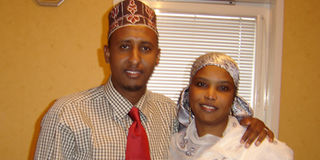Lessons for Somalia from Sweden

Mr Yassin Mallin with wife Raha Soyolel. Photos/ CORRESPONDENT
Yassin Mahi Mallin was aged 20, when he fled to Sweden to escape the never-ending in his motherland Somalia.
And Sweden, whose cool temperatures contrast with the scorching climate of the now pirate-infested Horn of Africa country not only became his adopted home, but also gave him the opportunity to exploit his leadership skills.
Today, Mr Mallin who left his Mogadishu home in 1990 is making history. He is not only a councillor — serving his second four-year term — in Katrineholm City in Sodermanland, but has been a police officer for two years.
And he has been the council’s culture and consumer committee deputy representative since 1999. He was first elected in 2002, and was re-elected in 2006.
Mr Mallin also doubles as a deputy member of Sodermanland municipal council. In 2004, Mr Mallin, founded the Somali Social Unity Party of which he is the chairman.
The Katrineholm-based party hopes to introduce democracy in Somalia. He says SSUP, which enjoys support from Swedish Social Democratic Party, has about 4,000 members drawn from and around the world.
Mr Mallin, who also runs a media house, Somaliweyn, plans to relocate SSUP to Mogadishu once the fighting back home cools down.
The media house runs a magazine and a website. Its radio station broadcasts from Sweden and Somalia. A graduate of Swedish Language Pedagogic Institute, Mr Mallin is a teacher of Swedish, politics and social work at various schools in Sodermanland.
The youthful leader, who was hired by the Police Authority of the County of Sodermanland and served between November 2006 and March this year, had in 2006 vied for a parliamentary seat on the then ruling Swedish Social Democratic Party, of then Prime Minister Goran Persson.
Although he occasionally campaigned with the PM, both did not make it to Parliament. However, Mr Mallin, a multiparty democracy crusader, is a de facto Swedish ambassador to Somalia in a bid to help restore peace in his birthplace.
The Swedish-trained teacher is a frequent visitor to his motherland and holds talks with top Somali Caretaker Government officials including the President and Prime Minister, sometimes in Nairobi. His major mission is to help replace clan-based politics with multiparty democracy.
Like many of his compatriots, Mr Mallin is unhappy with the pathetic political situation back home. He has a dream that one day sanity will be back to Somalia.
“I would like to transfer political knowledge I’ve gained in Sweden to my home country. I want to change the attitude of my people where politicians must be endorsed by clan elders before they seek leadership positions.
“People should be judged by their ability to lead. When it comes to leadership of the nation, our people should support candidates based on what they can deliver and not on which clans they come from.
“Leadership is not about serving one’s clan or community but the nation. It is easier for a Somali to be a leader in Sweden than in Somalia.
“In Sweden, people are judged by their ability to lead and not by their ethnic background,” Mr Mallin told the Nation in Nairobi last week, during a stop-over as he made another of his many peace missions to the peace-starved country.
“Many people around the world ask if Somalia can ever be a democracy, where leadership is based on competitive politics rather than clannism.
“To borrow US president elect Barack Obama’s slogan, I would say ‘Yes, We Can.’ But only if we live as Somalis and not Somali clans.
“I am committed to making people change their thinking from clannism to being one people and one country.
“I believe Somalia has more opportunities for peace compared to other world countries, as we all come from same ethnic background, we have the same religion, the same culture, and speak the same language.
“Our only major problem is clannism. After more than 18 years of civil war, there has never been a united government simply because of clannism.
“I cannot come and influence the current system in Somalia now. Tribalism or clannism, and nation-building cannot work together. But, I am optimistic. With the support of the international community, we can change the system.
“If Somali people want to get out of the current mess, they can do it sooner rather than later. We need to learn from other countries like Kenya where there is freedom of expression.
“My dream is to see a democratic Somalia, where leaders are not elected on the basis of their clans but their potential to lead.”
And what motivated him to join competitive politics in an adopted homeland? “I found Somalis were finding it difficult to get equal treatment with the Swedes.
“There was discrimination. I joined politics to fight for the rights of the Somalis as well as other foreigners in Sweden,” says Mallin, a father of four.



